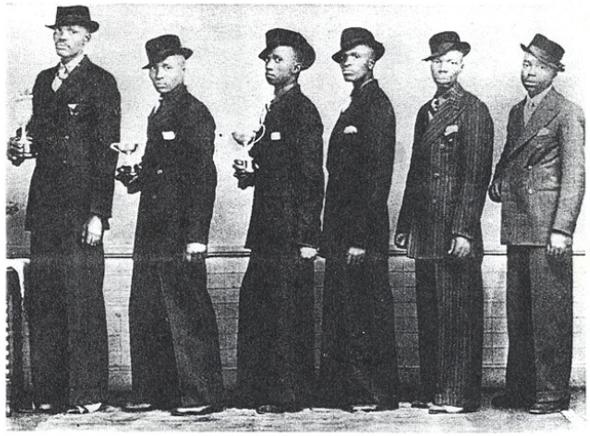| RalphBorland.net |
| Song of Solomon p. 1 2 3 |

|
| Solomon Linda and the Evening Birds, ca. 1941 From left: Solomon Linda, Gilbert Madondo, Boy Sibiya, Gideon Mkhize, Samuel Mlangeni, Owen Sikhakhane (The source of this early publicity photograph of the band is not known to me - and on websites from the PBS to the lawyers who represent Solomon Linda's family, the source is not credited. My copy of the image is a scan of a photocopy) 'Song of Solomon' is an aleatoric audio collage, an 8-channel audio installation that samples many versions of 'Mbube', aka 'Wimoweh' aka 'The Lion Sleeps Tonight', in a sonic tribute to the song's dead author Solomon Linda. By fragmenting and reordering compositional fragments of this 'song of songs', the installation questions the assumptions about compositional innovation and imitation that inform Western intellectual property law. In this jungle of sounds, the dead Author rests. 'The song of songs, which is Solomon's ...' - (Shir ha-Shirim v1) --- In the 1930s a twenty-something Solomon Linda, escaping a drought-ridden KwaZulu-Natal, arrived in Johannesburg. Within two years in the city of gold he was leading a group called the 'Evening Birds', soon becoming a hit in the hostels with his sharp dress sense and dance moves. In 1939 Eric Gallo's studio recorded Linda's song 'Mbube', paying him ten shillings on the day for the song as well as his rights to it. 'Mbube' was to prove a hit for years after this South African release, selling perhaps as many as 100 000 copies. Yet this was nothing compared to the fame that the song would come to attract. Ten years after its release, the record found its way to folk singer Pete Seeger, and his band made a recording of the song as 'Wimoweh', which went to number 6 on the charts. Then, in 1961, songwriter George David Weiss added ten words and a new arrangement. The song was reborn once again as 'The Lion Sleeps Tonight', perhaps one of the world's best known songs. The song also became, to a large extent, Weiss' intellectual property. Solomon Linda died a pauper in 1962, and his struggling daughters received none of the almost $15 million that the song is estimated to have generated in its career. It was only in 2006 that Weiss' publisher agreed, under threat of legal suit, to pay royalties to Linda's estate. This narrative of the lineage of 'Mbube'/'Wimoweh'/'A Lion Sleeps Tonight', with its focus on originality, ownership and theft, is framed by the international discourse of intellectual property law that emanates from the global North. This framework privileges stories of individual authorship and original genius, obscuring other, more complex stories of collective authorship, cultural flow and genre formation. Indeed, 'mbube', which is both the name of a song and the name of a generic style of performance, participates in complex lineages of cultural flow across the Black Atlantic, such as the importation to South Africa of African-American practices of jubilee singing and minstrelsy by Orpheus MacAdoo in the 1890's. For their installation 'Song of Solomon', Julian Jonker and Ralph Borland have created an aleatoric audio collage drawing on the estimated 400 recorded versions of 'Mbube'/ 'Wimoweh'/ 'A Lion Sleeps Tonight', as well as other examples of the mbube genre and older ancestral forms. 'Morpheus', a custom-built software application, samples these musical texts, continually arranging and rearranging 'original' and 'imitated' compositional elements across the installation space. These practices of sampling and aleatoric composition reference contemporary cultural practices subversive of intellectual property law, and also interrogate the assumptions about processes and lineages of composition and imitation that inform intellectual property law. The installation in this way recreates a jungle of song in which the dead Author might find a suitable resting place. --- 'Song of Solomon' is an audio installation by Julian Jonker and Ralph Borland, first exhibited at the Durban Art Gallery, Durban, South Africa, in September 2006. The Mail&Guardian newspaper published a review of the show, by Niren Tolsi. Listen to/ download a live stereo recording of the installation: 3 minute/ 4 MB clip or 20 minute/ 39 MB clip. --- Julian Jonker is a writer and cultural producer based in Cape Town. His work explores crises in cultural property, heritage, and memory. Also known as ‘liberation chabalala’, he is a DJ, sound artist and member of the Fong Kong Bantu Sound System. Ralph Borland is a South African artist, designer and technologist. He is pursuing his PhD with the ‘Disruptive Design Team’, a research group at Trinity College, Dublin that uses art and technology development as a means of interrogating social and political structures. --- For a technical overview of 'Song of Solomon' please go to the next page. The legal issues around the installation are explored on page 3.
|